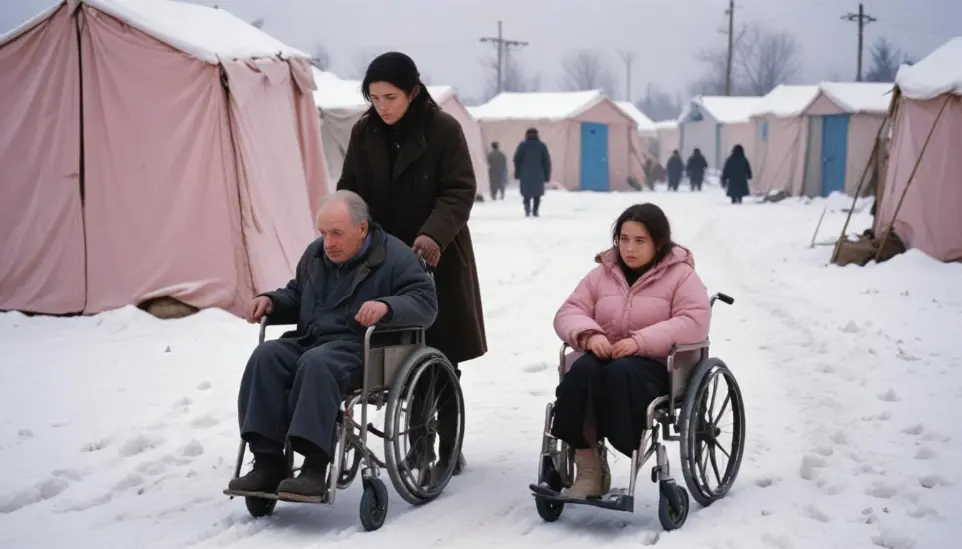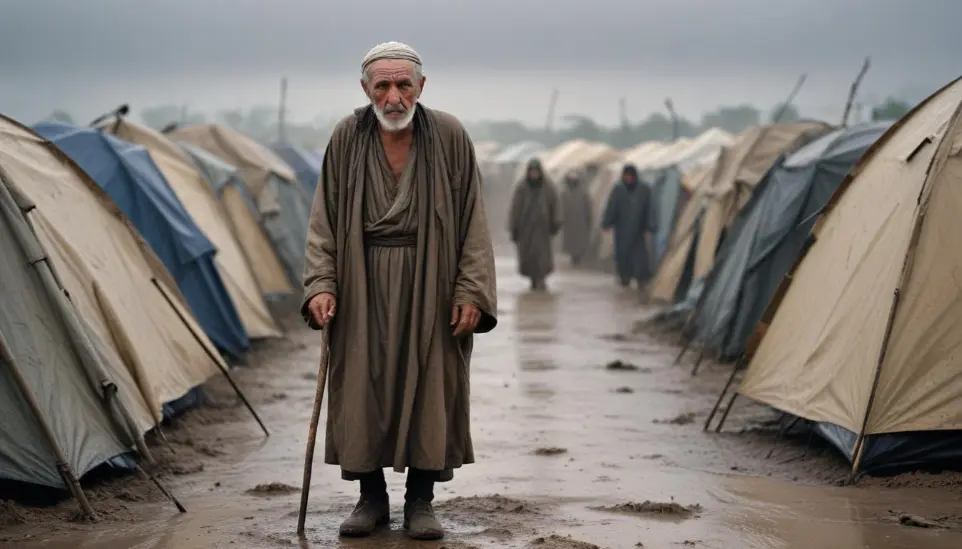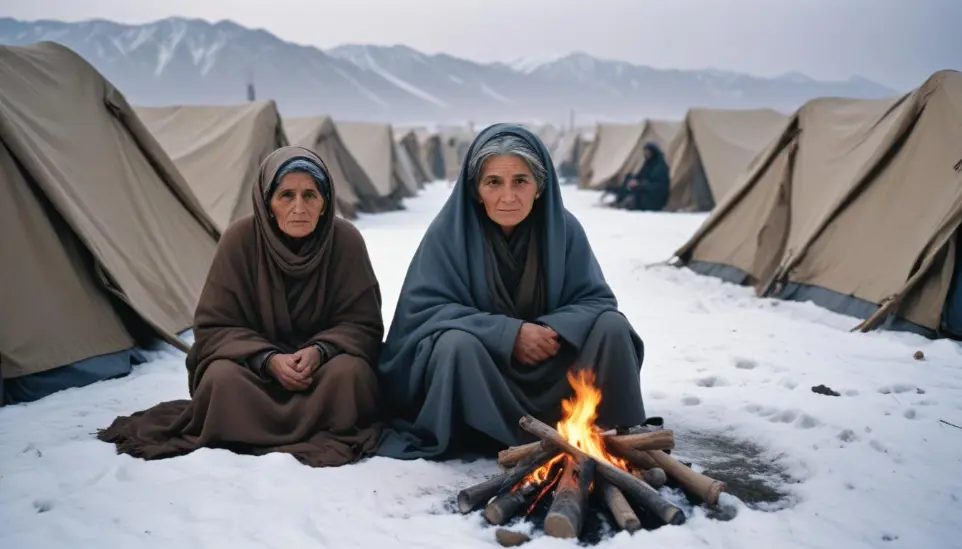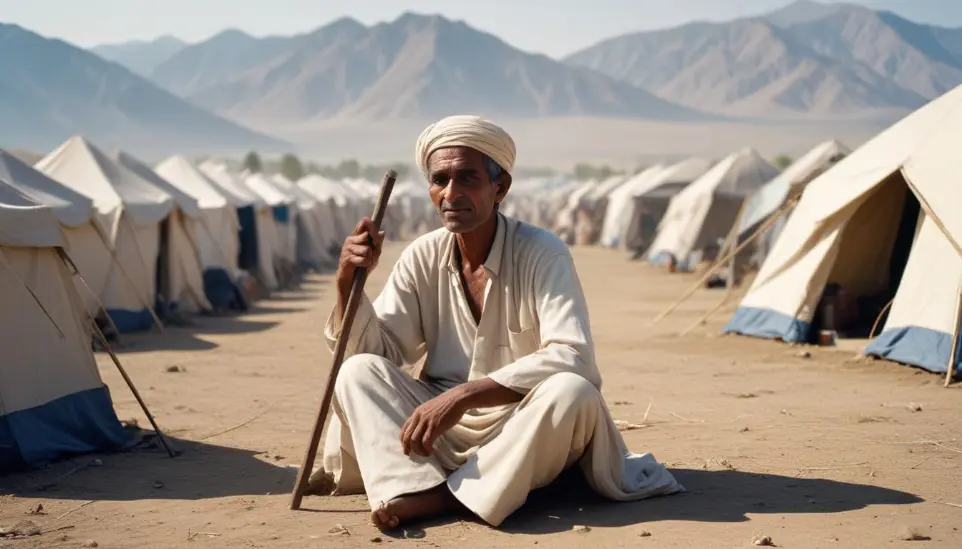



Protecting the Most Vulnerable: Refugees with Special Needs
The refugee and asylum-seeking population worldwide is growing as humanitarian crises increase. Within this population, people with disabilities constitute a particularly vulnerable group. These individuals, like others, must cope with all the factors generated by forced displacement itself, but with the individual constraints derived from the effects of their disability. Although the Spanish international protection regulatory framework provides a line of guarantees and reinforced protection for vulnerable groups, including people with disabilities, this population has been widely ignored, and their specific needs go unmet, making it much more difficult for them to achieve inclusion in today's society.
Introduction
Refugees with special needs are those individuals who, due to their physical, mental, sensory, or intellectual condition, face additional challenges and require specialized care to ensure their well-being and protection. These needs may arise due to physical or mental disabilities, chronic illnesses, psychological trauma, advanced age, pregnancy, or any other condition that makes them more vulnerable in the context of forced displacement.
Refugees with special needs may face significant obstacles in accessing basic services, such as healthcare, education, and housing, placing them in a situation of greater vulnerability compared to other refugees. It is critical to recognize their specific needs and ensure they receive appropriate assistance and protection in accordance with international human rights and refugee standards.
The UN Convention on the Rights of Persons with Disabilities clearly establishes that persons with disabilities, including refugees, have the right to enjoy all human rights and fundamental freedoms on an equal basis with others. This broad and comprehensive definition of the special needs of refugees highlights the importance of addressing the diversity of situations that can arise in the context of forced displacement.
The situation of refugees with special needs globally is complex and challenging. According to the United Nations High Commissioner for Refugees (UNHCR), it is estimated that at least 15% of the world's population has some type of disability, and this proportion may be even higher among refugees due to exposure to conflict, violence, and forced displacement.
Refugees with special needs face additional barriers to accessing essential services, which can exacerbate their vulnerability and exposure to human rights violations. The lack of accessible infrastructure, the scarcity of mental health services, discrimination and stigma, as well as the limited availability of targeted support, contribute to a precarious situation for these refugees.
Furthermore, humanitarian crises and armed conflicts can disrupt access to healthcare and rehabilitation services, disproportionately affecting refugees with disabilities and special needs. The lack of accurate and disaggregated data on this population hampers effective humanitarian planning and response, underscoring the need for a more comprehensive approach to addressing their specific needs.
Protecting the rights of refugees with special needs is crucial to ensuring they have equal opportunities, access to appropriate services, and protection from discrimination and abuse. Effectively addressing the specific needs of this population contributes to building more inclusive, equitable, and human rights-respecting societies.
Implementing policies and programs that recognize and respond to the needs of refugees with disabilities and other special needs is critical to fulfilling the principles of equality, non-discrimination, and full participation in community life. This involves promoting accessible environments, providing support services, training humanitarian personnel, and raising awareness about issues related to disabilities and special needs.
Respecting and protecting the rights of refugees with special needs are not only ethical imperatives but also legal obligations under international human rights law and the right to asylum. Ensuring their inclusion and active participation in decision-making processes that affect their lives is fundamental to achieving a comprehensive approach to refugee protection and advancing the realization of human rights for all, leaving no one behind.
Global Human Rights Context
The protection of human rights in situations of armed conflict is a vitally important issue at the global level. During armed conflicts, people's fundamental rights are threatened, which requires special attention from the international community. In this context, a comprehensive analysis of the human rights violations that occur in the midst of conflict is necessary, as well as the measures necessary to guarantee their protection.
The Geneva Convention and its Additional Protocols constitute the fundamental legal framework for the protection of human rights in situations of armed conflict. These instruments establish clear standards for the protection of the civilian population, including refugees, during armed conflicts, and are essential for ensuring respect for human rights in these contexts.
It is crucial that States and actors involved in armed conflicts respect and comply with these standards in order to protect the human rights of all affected persons, including refugees.
The protection of refugees within the framework of human rights is a fundamental aspect of the international agenda. In this regard, it is crucial to conduct a comprehensive exploration of the measures necessary to ensure the effective protection of refugees, especially in situations of armed conflict.
Refugees are people who are outside their country of origin due to well-founded fears of persecution, conflict, generalized violence, or other circumstances that have seriously disturbed public order. In the context of armed conflict, the protection of refugees takes on particular relevance, given that these people are in a situation of particular vulnerability.
The protection of refugees within the framework of human rights requires the adoption of concrete measures by the international community, including ensuring access to humanitarian assistance, preventing refoulement, respecting the principle of non-refoulement, and promoting durable solutions for their situation.
Refugees with special needs, such as persons with disabilities, pregnant women, older persons, and unaccompanied minors, face additional challenges in the context of armed conflict. Therefore, it is essential to recognize and guarantee their specific rights within the framework of refugee protection and human rights.
These refugee groups require specialized care and specific protection measures that address their particular needs. For example, it is crucial to ensure access to adequate health services, protection from gender-based violence, psychosocial support, and family reunification, among other specific measures that guarantee their well-being and protection in situations of armed conflict.
The international community must work in partnership with humanitarian organizations and host States to ensure that refugees with special needs receive the necessary protection and assistance, in accordance with the principles and standards established within the framework of human rights and refugee protection.
Introduction
Refugees with special needs are those who, due to their physical, mental, or emotional condition, face additional challenges when seeking refuge and protection in a foreign country. International law recognizes the importance of ensuring the protection and well-being of this vulnerable group, establishing specific standards and guidelines for their safeguarding.
The 1951 Convention relating to the Status of Refugees and its 1967 Protocol are the fundamental legal instruments that establish the rights and obligations of States with regard to refugees. These documents emphasize the importance of ensuring the protection of refugees with special needs, ensuring that they are not discriminated against and that they receive the necessary assistance to meet their specific needs.
Furthermore, the 2006 Convention on the Rights of Persons with Disabilities and its Optional Protocol underscore the need to protect and promote the human rights of persons with disabilities, including those who are refugees. These legal instruments provide a comprehensive framework for addressing the special needs of refugees with disabilities, recognizing their right to equal opportunities and full participation in society.
Despite advances in international legislation, refugees with special needs continue to face numerous challenges and obstacles in their search for protection and assistance. Lack of adequate resources, discrimination, lack of access to specialized services, and insufficient awareness of the specific needs of this group are just some of the barriers that hinder their full integration and protection.
Furthermore, emergencies and humanitarian crises can further exacerbate the difficulties faced by refugees with special needs, leaving them at greater vulnerability and risk. The shortage of facilities and services tailored to their needs, as well as difficulties in accessing adequate medical and psychosocial care, represent significant challenges that require effective and coordinated responses from the international community.
Stigmatization and a lack of awareness of the specific needs of refugees with disabilities also contribute to their marginalization and exclusion, underscoring the importance of developing effective strategies and approaches to address these challenges comprehensively.
To address the challenges of protecting refugees with special needs, it is essential to implement effective strategies and approaches that ensure their inclusion, participation, and equitable access to available services and resources. This includes promoting universal accessibility in physical and social settings, training humanitarian and aid personnel to address the specific needs of this group, and promoting awareness and understanding of the diverse disabilities and needs that refugees with special needs may present.
Furthermore, intersectoral collaboration between governmental, non-governmental, and civil society organizations is essential to ensure a coordinated and effective response that addresses the needs of refugees with disabilities. This entails the design and implementation of inclusive programs and policies that consider the specific needs of this group, as well as the allocation of adequate resources to ensure their protection and well-being in the context of forced displacement.
Furthermore, it is crucial to involve refugees with special needs themselves in planning and decision-making that affects their lives, ensuring their active participation and empowerment in protection and humanitarian assistance processes. This not only promotes their autonomy and dignity but also contributes to the creation of sustainable, people-centered solutions to address their specific needs.
Actions and Responsibilities
The protection of the human rights of refugees with special needs is a crucial responsibility of governments and international organizations. Governments have an obligation to ensure that refugee laws and policies include specific provisions to address the needs of persons with disabilities, pregnant women, unaccompanied children, and other vulnerable persons. Likewise, international organizations, such as UNHCR, have a duty to provide technical assistance and financial support to governments to ensure that refugees with special needs receive the protection and support they require.
It is essential that governments implement concrete measures to guarantee the protection of refugees with special needs. These measures may include the creation of specialized care centers, training specialized personnel in the care of persons with disabilities, establishing care protocols for pregnant women, and allocating specific resources for the protection of unaccompanied children.
Collaboration between governments, international organizations, NGOs, and other relevant actors is essential to ensure the effective protection of refugees with special needs. This collaboration should focus on the development and implementation of inclusive policies, the creation of specific assistance programs, and the continuous monitoring of the living conditions of these vulnerable people.
To ensure the effective protection of refugees with special needs, governments and international organizations must adopt concrete measures. Some of these measures include:
- Implementation of specific laws and policies to protect refugees with disabilities, pregnant women, unaccompanied children, and other vulnerable individuals.
- Creation of specialized care centers and training of staff in the care of individuals with special needs.
- Establishment of medical and psychosocial care protocols tailored to the needs of refugees with disabilities.
- Allocation of specific financial and human resources for the protection of refugees with special needs.
- Development of assistance programs that address the particular needs of each vulnerable group.
These actions are essential to ensure that refugees with special needs receive the protection and support they need to rebuild their lives in a safe and dignified environment.
The comprehensive protection of refugees with special needs requires close collaboration between governments, international organizations, NGOs, UN agencies, and other relevant actors. This collaboration should be aimed at developing and implementing inclusive policies, specific assistance programs, and monitoring mechanisms to ensure the respect of the human rights of these vulnerable people. Furthermore, it is crucial to involve refugee communities themselves in the planning and implementation of protection measures, recognizing their experience and knowledge as fundamental elements to guarantee the effectiveness of the actions undertaken.
Collaboration among different actors also entails coordinating efforts to identify and address the specific needs of each vulnerable group, ensuring that no refugee with special needs is excluded from the protection and assistance necessary to rebuild their lives in conditions of dignity and safety.
Impact and Consequences
Effective protection for refugees with special needs has a significant impact on their quality of life and well-being. When provided with a safe and supportive environment, these individuals can access medical, educational, and social services that allow them to fully develop. Effective protection also gives them the opportunity to integrate into the host society, thus contributing to the cultural and social enrichment of the community.
Access to effective protection gives them the opportunity to rebuild their lives in an environment that recognizes and respects their rights and needs, which in turn promotes their autonomy and dignity.
Effective protection not only positively impacts the lives of refugees with special needs at the individual level but also contributes to building more inclusive and equitable societies.
The lack of protection and support for refugees with special needs can have devastating consequences. These individuals, being in a vulnerable situation, face increased risks of abuse, discrimination, and exclusion. The absence of effective protection measures exposes them to precarious conditions, limiting their access to basic services and exposing them to situations of danger and exploitation.
Furthermore, the lack of support can negatively impact their physical and mental health, as well as their ability to develop and actively participate in society. The exclusion and lack of opportunities resulting from the absence of effective protection can perpetuate a cycle of marginalization and inequality for these refugees.
The lack of protection and support for refugees with special needs not only affects their individual well-being but also represents an obstacle to building more just and inclusive societies.
Awareness and education play a fundamental role in the protection of refugees with special needs. Through awareness-raising programs, it is possible to promote greater understanding and empathy for the realities and challenges these individuals face, which in turn contributes to the creation of more compassionate and inclusive environments.
Education, for its part, plays a key role in empowering refugees with special needs by providing them with tools and skills that allow them to function independently. Access to education tailored to their specific needs offers them the opportunity to develop their potential and contribute meaningfully to society.
Awareness-raising and education are not only essential for the protection of refugees with special needs, but are also pillars for building more inclusive and human rights-respecting soci
Conclusions
The future challenges in the protection of refugees with special needs are diverse and complex. One of the main challenges is ensuring access to adequate health services for refugees with physical or mental disabilities. This entails adapting healthcare facilities and mental health programs to meet the specific needs of this group of refugees.
Another important challenge is ensuring that refugees with special needs have access to education. This entails developing inclusive educational programs that can address the diverse needs of refugees with disabilities, ensuring that they do not fall behind in terms of educational and social development.
Furthermore, it is critical to address the stigma and discrimination faced by refugees with special needs, as this can hinder their integration into the host society and limit their opportunities for personal and professional development. Overcoming these challenges will require a comprehensive approach involving governments, international organizations, NGOs, and society at large.
To ensure the protection of refugees with special needs, it is essential that governments and international organizations make concrete and tangible commitments. This includes allocating adequate resources to ensure access to health, education, housing, and employment services for refugees with disabilities.
Furthermore, the implementation of specific policies and programs that address the unique needs of this group of refugees is required, ensuring that they are not excluded or marginalized in the integration process. Likewise, it is crucial to promote awareness and training for officials and professionals who work with refugees so that they are qualified to address the needs of those with disabilities or special needs.
The necessary commitments must also include promoting laws and regulations that protect the rights of refugees with special needs, guaranteeing their access to justice and active participation in society. Only through a comprehensive and committed approach can the protection and well-being of this group of refugees be ensured.
The protection of refugees with special needs has a significant impact on the promotion of global human rights. Ensuring that this group of refugees receives appropriate protection and support sends a clear message about the value and importance of inclusion and equal opportunities for all people, regardless of their circumstances.
Furthermore, the effective protection of refugees with special needs contributes to building more just and equitable societies, while strengthening the social fabric by recognizing and respecting human diversity in all its forms. This, in turn, promotes global peace and stability by fostering social cohesion and collaboration between different communities and countries.
The protection of refugees with special needs is fundamental to the promotion of global human rights, as it represents a commitment to human dignity, equality, and justice for all.

 IHRO NEWS
IHRO NEWS